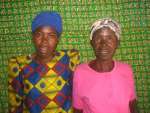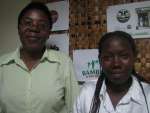Tuyisenge Francine & Uwituze Yvette
Sisters Bayisenge Francine and Uwituze Yvette discuss romantic relationships. Because Bayisenge Francine is ten years older than Yvette and both happily married and well-educated, she has strong advice to offer to her younger sister. She stresses the importance of remaining independent, ambitious, and driven, despite temptations to marry early. Bayisenge Francine urges Uwituze Yvette to finish school before getting married so that she can not only receive a full education herself, but can also ensure that her husband values education as well.
Bubanje Rosalie & Rudasingwa Lorette
Rudasingwa Lorette and her mother, Bubanje Rosalie, discuss the secrets to a successful marriage. Rudasingwa Lorette has recently gotten married and admires her parents' marriage and asks her mother how she can recreate the success they have had in remaining together. Bubanje Rosalie offers her advice about keeping a happy household through mutual respect between spouses and similar expectations in marriage.
Mukagatare Laetitia & Uwihoreye Seraphine
Uwihoreye Seraphine asks her aunt, Mukagatare Laetitia for advice on dating, intimate relationships, and the meaning of personal faith. Mukagatare Laetitia talks about her own adolescence and stresses the importance of women obtaining an education before they start worrying about men. Aunt and niece discuss Rwandan gender norms and Uwihoreye Seraphine learns how to protect herself in future relationships.
Murekatete Adrie & Umuhoza Alexie
Murekatete Adrie, Umuhoza Alexie’s aunt, wants to tell her niece about a former classmate who was orphaned in the genocide. Although lucky enough to be adopted and be given an education, she got in trouble at university by becoming involved with a young man who left her after she became pregnant by him. She wants to warn Umuhoza Alexie to avoid temptations and concentrate on her studies. “I am sure you cannot suffer when you have education.”
Habineza Pascal & Irakarama Joselyne
Irakarama Joselyne’s uncle, Habineza Pascal, is passionate about the value of a cow, and enthusiastically answers all of her questions regarding this Rwandan culture. Although she already understands the benefits of a cow, she does not fully understand the value of a cow. Irakarama Joselyne wants to know the reason why dowry is almost always done with a certain number of cows, and her uncle explains the significance of this transaction. He even touches upon an example of a government program called “one cow per family,” a system that helps fight poverty and malnutrition.
Mukamana Theopista & Umuvandimwe Marie Claire
Umuvandimwe Marie Claire looks up to Mukamana Theopista, and wants to hear about her friend's past in order to learn from her. When asked about what “was your happiest moment and what was your saddest moment,” Mukamana Theopista discusses growing up in poverty and moving through many tragedies into a positive present. She thanks God and her loving husband for supporting her through house fires, illness, and lost children. She encourages Umuvandimwe Marie Claire to be thankful for what she has and to have faith that she will have a good partner and strong marriage.
Karangwa Emmanuel & Ndahiro Jean Marie Vianney
Vianney snuck out of Rwanda to Burundi by crawling through forest surrounded by an army. He had a plan to join the forces that were fighting the genocide. When he got to Burundi, he forgot this plan and spent his time replenishing with food that had been donated to the refugee camp where he lived. He got his wakeup call when he was visited by a man he would never forget. The legacy he hopes to leave with his brother is that of a nation that rebuilds its cultural institutions and relies on its youth to think like heroes.
Kajuga Augustin & Nkurikiyimana Ignace
Kajuga Augustin, born in 1939, has much to tell Nkurikiyimana Ignace about Rwanda before colonialism: the history of kings and how power was transferred from one to another, how young people were treated differently by their mothers versus their fathers, and how they were joined in marriage. He recounts how some practices are thankfully outdated, like drowning unmarried, pregnant women, while some celebrate values that are still positive, such as respect and cooperation.
- « first
- ‹ previous
- 1
- 2
- 3












